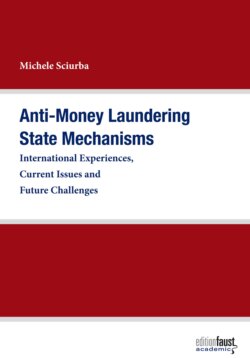Читать книгу Anti-Money Laundering State Mechanisms - Michele Sciurba - Страница 6
На сайте Литреса книга снята с продажи.
Preface
ОглавлениеThis academic work examines the objectives, development, implementation and effectiveness of global anti-money laundering regulations in the US and EU and the impact of their present implementation on civil and human rights. Anti-money laundering (AML) legislation was originally aimed at protecting financial institutions from misuse and only subsequently was expanded to include counter-terrorism financing (CTF) regulations. The implementation of these regulations have largely suspended the norms and laws governing privacy and bank secrecy, turning banks and other financial institutions into an extension of law enforcement. They have also imposed burdensome reporting requirements on banks, which in order to avoid legal liability and sanctions imposed by AML/CTF legislation for non-compliance have engaged in excessive and early reporting of suspicious financial activities. Banking de-risking policies have placed ordinary citizens under a general blanket of suspicion and resulted in them being denied bank accounts or having existing bank accounts closed. In addition, banks appear to use these policies to rid themselves of legitimate but less profitable customers, who are often socially at risk. As a result, the implementation of the AML/CTF legal framework as it stands is discriminatory and infringes the European Convention on Human Rights and the Charter of Fundamental Human Rights of the European Union.
The political pressure to combat international terrorism in the wake of 9/11 sparked a flurry of AML/CTF legislation aimed at cutting off funding for terrorists. In the US, there was the passage of the USA Patriot Act 2001 and the tightening of the Bank Secrecy Act 1970; in the UK the Proceeds of Crime Act 2002 was passed and at the EU level the Fourth Anti-Money Laundering Directive (4th AMLD) was implemented. These laws added tax evasion to the list of money launering offences and, in conjunction with current Financial Action Task Force (FATF) Recommendations, have created a change from a punitive to a preventive rationale for this legislation.
Given the original aims of AML and CTF legislation, marrying these two distinct law enforcement objections into one legislative package has produced mixed results. Both in terms of efficiency and fairness, AML/CTF legislation seems to fall short of its goals. The changing face of global terrorism since 9/11, especially with regard to terrorist financing, raises questions as to whether the FATF Recommendations implemented in the 4th AMLD are in fact the best means for preventing terrorist financing and, thus, terrorist attacks. In recent years, as terrorist organisations have been defeated on the battlefield and the fight has moved to civilian targets in Europe and elsewhere, it has become clear that planning and executing a terrorist attack does not require a significant commitment of financial resources or reliance on dubious and complex international financial transactions. Hence, in addition to being discriminatory and incompatible with international and European human rights law, it is questionable whether current AML/CTF mechanisms are effective.
A contributing factor to the inefficiency of AML/CTF regulatory and legislative measures is inconsistent rules. An example of this inconsistency is the treatment of the 4th AMLD with respect to tax predicate offences. Such inconsistencies make it more difficult for national investigative authorities within the European Union and internationally to cooperate with each other. As a result, this monograph argues that regulatory and legislative harmonisation with respect to the United States and other FATF members is central to improving the effectiveness of AML/CTF regimes.
This academic work also examines the connection between money laundering and corruption. Corruption is often a challenge for developing economies and countries transitioning to democratic forms of government. It weakens political and economic reform by creating perverse incentives that undermine free and fair competition. Political corruption opens up the system of public policy to the highest bidder. In many developing countries, the presence of rich natural resources offer abundant opportunities for corruption and bribery that put the brakes on democratic reforms and economic development. In fact, reducing corruption is the single most important factor for improving government efficiency and public service.
Finally, this monograph suggests how AML/CTF regimes can be improved by harmonising national and international legislative and administrative requirements without ignoring violations of civil liberties. Clearly, terrorism poses a grave danger to international security. There is, therefore, a legitimate interest in national and international security. The legitimate need for national security needs to be balanced, however, against the individual right to privacy, due process and civil rights. National security cannot be used as a blanket excuse to suspend or disregard fundamental rights. While much research in the field has focused on the effectiveness of AML/CTF legislation, there has been a striking lack of interest in the impact of the current implementation of these rules on human and civil rights. This monograph seeks to close this research gap by examining how AML/CTF legislation in the US, the EU and the UK can more effectively combat money laundering, terrorist financing and tax evasion without compromising fundamental human and civil rights.
Michele Sciurba
10 February 2018
